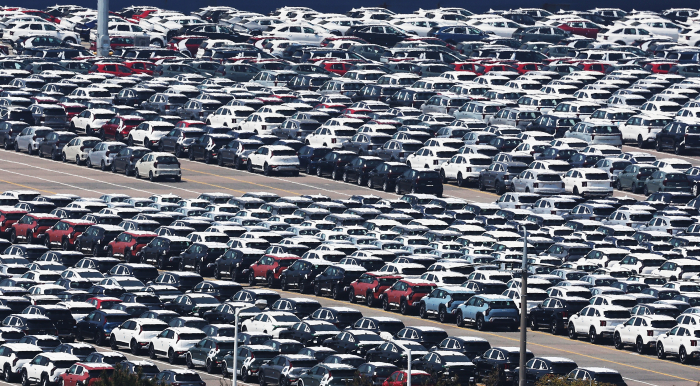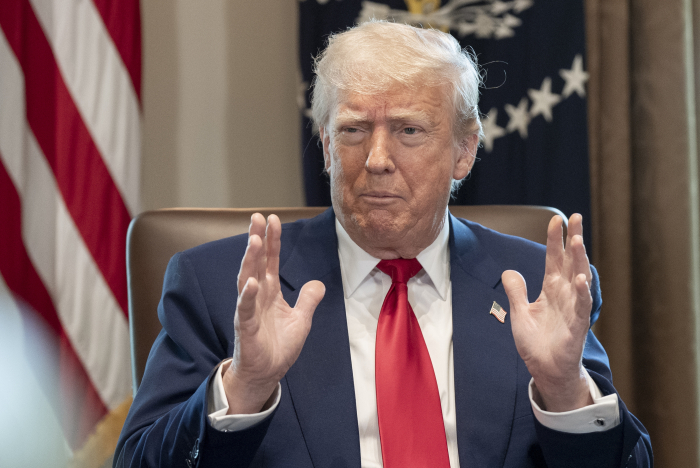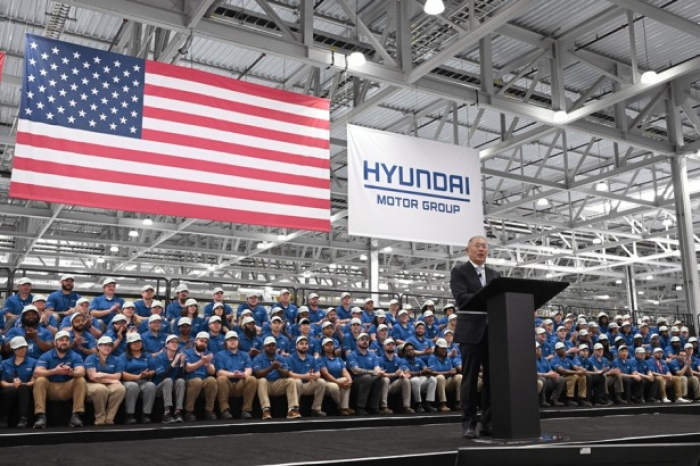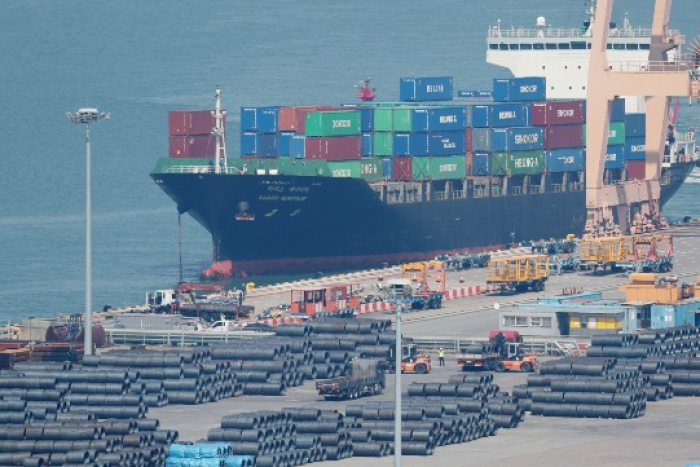US auto parts tariffs into force; Korea avoids heavy hit
Analysts say South Korea could emerge as a beneficiary of the US tariff measures by replacing China in supply chains
By 6 HOURS AGO
LG Chem to sell water filter business to Glenwood PE for $692 million


Mirae Asset to be named Korea Post’s core real estate fund operator


Meritz backs half of ex-manager’s $210 mn hedge fund


StockX in merger talks with Naver’s online reseller Kream


KT&G eyes overseas M&A after rejecting activist fund's offer



The US has eased tariffs on automotive parts that took effect on May 3, offering a sigh of relief to South Korean suppliers, who said a worst-case scenario under the US tariff policy has been avoided.
Early last week, US President Donald Trump announced modifications to the 25% tariffs on foreign parts used to manufacture cars in the US, aiming to give carmakers time to transition to US-based suppliers.
Under the revised measures, 22 types of Korean-made auto parts, including leaf springs and suspension components, will be exempt from steep import duties for the next two years following the implementation of 25 tariffs on imported vehicles on April 3.
According to the Korea International Trade Association, foreign-made cars containing those Korean components had been at risk of facing double import duties of up to 50% under the original US tariff policy as the parts were classified as derivative products of steel and aluminum.
Under the modified automotive tariffs, however, duties on auto parts equivalent to 15% of the value of a US-made automobile will be suspended for the first year. In the second year, the suspension will be reduced to 10% before being phased out entirely.
The new tariffs will not be applied on top of the existing 10% base tariffs, or the country-specific reciprocal tariffs of up to 50%.
Auto parts from Canada and Mexico in compliance with the US-Mexico-Canada Agreement will continue to be exempt of 25% tariffs.

BENEFICIARY OF TARIFFS?
“If the US impose uniform tariffs of over 60% on Chinese auto parts makers, some (US automakers) will shift to Korean products, giving Korean suppliers some boost,” said Kim Kyung-yoo, senior research fellow at the Korea Institute for Industrial Economics and Trade.
Trump’s tariffs on China will continue applying on top of auto and parts tariffs.
The US is the largest export market for South Korea auto parts makers. In 2024, it accounted for 36.5% of their overseas shipments, compared to 29.5% in 2020.

Analysts warn the auto parts tariffs would have a greater negative impact on the US economy than the import duties on foreign-made vehicles.
According to CNN, not a single of the 10 million cars turned out by US plants last year was built without at least some imported parts. The tariffs on parts could now mean tens of billions of dollars in new cost to the industry and eventually to American car buyers and owners.
Even with the modified levies on auto parts, the tariffs could still add an average of about $4,000 per vehicle, according to a CNN analysis of government trade data.
Worse yet, most of their imports from Mexico could not be tariff-free. The country may not be able to meet the requirement that parts suppliers must pay their workers $16 or more an hour under the US-Mexico-Canada Agreement to be eligible for tariff exemption.

In response to Trump’s warning against top automakers raising prices last month, General Motors Co., Ford Motor Co., Hyundai Motor Co. and other automakers have pledged not to raise vehicle prices in the US for several months.
But eventually, they may have no choice but to pass tariff-related cost increases onto customers, which will likely end up pushing up repair prices and insurance premiums, adding to inflationary pressures.
According to Nikkei, 169 out of 551 vehicle models registered with the US National Highway Traffic Safety Administration (NHTSA) have parts import ratios exceeding 50%.
Mercedes-Benz topped the list with 90%, followed by BMW at 73%, while Ford, GM and Nissan each had around 60%. Hyundai’s import ratio was in the 50% range.
Write to Jung-Eun Shin at newyearis@hankyung.com
Yeonhee Kim edited this article.
-
 AutomobilesBMW surpasses Mercedes in Korean sales for 1st time in 10 years
AutomobilesBMW surpasses Mercedes in Korean sales for 1st time in 10 yearsMay 02, 2025 (Gmt+09:00)
2 Min read -
 Business & PoliticsUS tariffs add risk premium to dollar assets: Maurice Obstfeld
Business & PoliticsUS tariffs add risk premium to dollar assets: Maurice ObstfeldApr 29, 2025 (Gmt+09:00)
3 Min read -
 AutomobilesExports of Korea-made used cars to hit record high in 2025
AutomobilesExports of Korea-made used cars to hit record high in 2025Apr 29, 2025 (Gmt+09:00)
4 Min read -
 Business & PoliticsSeoul, Washington agree on July tariff deal framework in '2+2' trade talks
Business & PoliticsSeoul, Washington agree on July tariff deal framework in '2+2' trade talksApr 25, 2025 (Gmt+09:00)
4 Min read -
 EarningsKia maintains double-digit margin in Q1 with record revenue
EarningsKia maintains double-digit margin in Q1 with record revenueApr 25, 2025 (Gmt+09:00)
2 Min read -
 EarningsHyundai Motor posts solid Q1; rough road ahead on Trump's auto tariffs
EarningsHyundai Motor posts solid Q1; rough road ahead on Trump's auto tariffsApr 24, 2025 (Gmt+09:00)
4 Min read -
 AutomobilesHyundai to launch 42 new cars to cope with Trump tariffs, EV slowdown
AutomobilesHyundai to launch 42 new cars to cope with Trump tariffs, EV slowdownApr 20, 2025 (Gmt+09:00)
4 Min read -
 AutomobilesKia to build North America-targeted electric pickup model
AutomobilesKia to build North America-targeted electric pickup modelApr 09, 2025 (Gmt+09:00)
3 Min read -
 AutomobilesHyundai’s new American dream comes with new plant, more spending
AutomobilesHyundai’s new American dream comes with new plant, more spendingMar 27, 2025 (Gmt+09:00)
6 Min read -
 AutomobilesHyundai Motor to invest $21 billion in US amid tariff concerns
AutomobilesHyundai Motor to invest $21 billion in US amid tariff concernsMar 25, 2025 (Gmt+09:00)
4 Min read -
 AutomobilesHyundai, Kia enjoy record January US sales on eco-friendly cars
AutomobilesHyundai, Kia enjoy record January US sales on eco-friendly carsFeb 03, 2025 (Gmt+09:00)
1 Min read -
 Electric vehiclesHyundai, Kia ready to ramp up EV output in Europe, US
Electric vehiclesHyundai, Kia ready to ramp up EV output in Europe, USMar 06, 2025 (Gmt+09:00)
3 Min read


